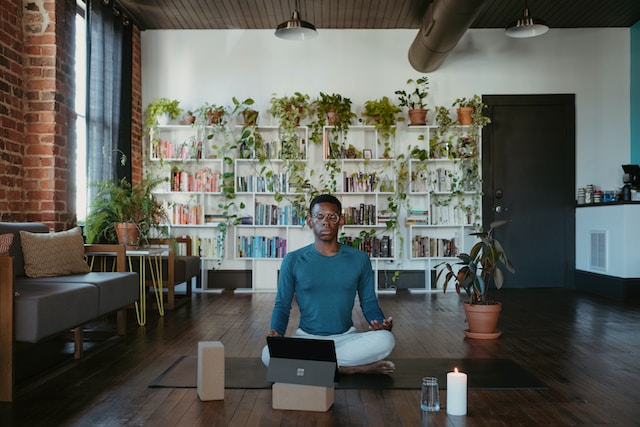
Meditation, an ancient practice deeply rooted in mindfulness and self-awareness, has emerged as a powerful tool to combat stress and restore balance in our lives. Meditation for stress relief provides a sanctuary amidst the chaos, a haven where you can find inner peace and rejuvenation.
Through the simple act of sitting in stillness and focusing our attention on the present moment, meditation enables us to cultivate a profound sense of calm and clarity. It acts as a soothing balm for our weary minds, gently guiding us towards a state of deep relaxation and emotional equilibrium.
Moreover, science has not only unraveled the emotional and psychological benefits of meditation but also revealed its positive impact on our physical well-being. Regular practice has been linked to reduced blood pressure, improved sleep quality, enhanced immune system function, and even slowed aging processes.
Understanding the Stress Response
To effectively combat stress through meditation, it is essential to understand the intricacies of the stress response and how it affects our physical and mental well-being. Stress is our body’s natural reaction to any perceived threat or demand, also known as the fight or flight response.
When faced with a stressful situation, our sympathetic nervous system kicks into high gear, flooding our body with stress hormones like cortisol and adrenaline. These hormones prompt a range of physiological changes, including increased heart rate, rapid breathing, heightened alertness, and tightened muscles.
While this response is helpful in short bursts to deal with immediate danger, the constant activation of the stress response can have detrimental effects on our health over time. Chronic stress can weaken our immune system, impair cognitive function, disrupt sleep patterns, and contribute to the development of various physical and mental disorders.
By engaging in meditation, we can effectively counteract these harmful effects and restore balance to our bodies and minds. Through deliberate and focused attention, meditation soothes our nervous system, encouraging the activation of the parasympathetic nervous system, which is responsible for the relaxation response.
How Meditation Helps with Stress Relief
Meditation has long been recognized as a powerful tool for stress relief, offering numerous psychological, emotional, and physical benefits. By incorporating meditation for stress relief into your daily life, you can navigate stressors and restore balance and tranquility within yourself.
- Reducing Anxiety and Promoting Relaxation
Anxiety often accompanies stress, intensifying the impact on mental and physical well-being. Meditation provides a sanctuary of calm amidst the chaos, soothing the nervous system and promoting relaxation.

Engaging in deep and rhythmic breathing techniques during meditation activates the parasympathetic nervous system, triggering the relaxation response. This practice helps reduce anxiety levels and induces a sense of calm and tranquility.
Regular meditation has been shown to decrease cortisol, the primary stress hormone. As cortisol levels decrease, our body and mind experience a reduction in stress and an increase in overall well-being.
- Enhancing Emotional Well-being
Emotions play a significant role in our stress response. Meditation allows you to cultivate emotional intelligence and promotes positive emotions, enhancing our emotional well-being.
Mindfulness meditation encourages us to observe and accept our emotions without judgment. This practice creates a space for self-reflection and enables us to respond to stressors with greater equanimity, reducing emotional reactivity.
Loving-kindness meditation, a form of meditation that involves directing thoughts of kindness and compassion towards ourselves and others, nurtures positive emotions. This practice can counteract the negative impact of stress by fostering empathy, connection, and emotional resilience.
- Improving Cognitive Function
Stress can impair cognitive function, affecting concentration, memory, and decision-making abilities. Meditation offers a remedy by sharpening cognitive functions and enhancing mental clarity.
Regular meditation practice strengthens your ability to sustain focus and attention, enabling you to stay present and engaged with tasks at hand. Focused attention meditation, such as mantra meditation, hones our concentration skills and reduces mental distractions.
Studies have shown that meditation can enhance memory retention and cognitive flexibility. Through practices like body scan meditation, which involves directing attention to specific body parts, we cultivate a heightened awareness and improve memory recall.
- Strengthening Resilience
Resilience is the ability to adapt and bounce back in the face of adversity. Meditation empowers people to build resilience, equipping them with the tools to navigate stress and life challenges.
By embracing mindfulness and practicing acceptance, you develop the capacity to respond to stressors with greater resilience. Mindfulness allows you to acknowledge challenging emotions or situations without being overwhelmed, fostering a sense of inner strength and adaptability.
Meditation facilitates self-reflection and introspection, enabling you to gain insights into your patterns of thinking and behavior. This self-awareness helps you identify areas of personal growth and build resilience by learning from your experiences.

- Balancing Hormones and Enhancing Physical Health
Uncontrolled stress can have detrimental effects on your physical health. Meditation provides a natural solution by balancing hormones and promoting overall physical well-being.
As mentioned earlier, regular meditation practice plays a vital role in reducing cortisol levels, mitigating the negative impact of chronic stress on our physical health. Balanced cortisol levels support optimum immune function, digestion, and sleep.
Studies have shown that meditation enhances immune system function by increasing the production of antibodies and promoting a healthier immune response. This strengthens our body’s ability to fight off illnesses and infections.
Types of Meditation for Stress Relief
Mindfulness Meditation:
Mindfulness meditation involves focusing your attention on the present moment without judgment. By observing your thoughts, emotions, and sensations with curiosity and acceptance, mindfulness meditation helps you become aware of the patterns and triggers of stress in your life. This practice cultivates a sense of calm and inner peace, reduces anxiety, and enhances mental clarity.
Loving-Kindness Meditation:
Loving-kindness meditation involves directing thoughts of kindness, compassion, and goodwill towards yourself and others.
By generating feelings of love and compassion, loving-kindness meditation nurtures positive emotions and counteracts the negative impact of stress. This practice fosters empathy, connection, and emotional resilience, enhancing your overall emotional well-being.

Focused Attention Meditation:
Focused attention meditation involves concentrating your attention on a specific object, thought, or sensation. By training your mind to stay focused and reducing mental distractions, focused attention meditation improves concentration and attention span. This practice enhances cognitive function, memory retention, and decision-making abilities, helping you stay present and engaged with tasks.
Body Scan Meditation:
Body scan meditation involves systematically directing your attention to different body parts, observing physical sensations without judgment. By cultivating body awareness, body scan meditation helps release tension and promotes relaxation throughout the body. This practice improves memory recall, enhances self-awareness, and boosts physical relaxation, reducing the physical symptoms of stress.
Transcendental Meditation:
Transcendental Meditation (TM) involves using a mantra or a repeated word or phrase to achieve a state of deep relaxation and inner awareness. By repeating the mantra silently, TM allows the mind to settle into a state of deep rest, facilitating stress reduction and rejuvenation. This practice has been shown to lower cortisol levels, improve sleep quality, and increase overall well-being.
Incorporating one or more of these meditation techniques into your daily routine can provide an effective way to alleviate stress, restore balance, and enhance your overall well-being. Remember, each person may resonate with different types of meditation, so feel free to explore and find what works best for you.
Establishing a Meditation Practice
Embarking on a meditation journey is a beautiful endeavor that promises to transform your life, bringing you closer to inner peace and harmony. However, starting a meditation for stress relief practice can be overwhelming for beginners. Fear not, for with a few practical steps and a dash of commitment, you can establish a solid foundation for your meditation practice and reap the countless benefits that await.
Creating a Sacred Space
Choose a quiet and tranquil space in your home where you can immerse yourself in meditation without distractions. Clear clutter, decorate the space with plants, candles, or any items that bring you serenity. This sacred space will serve as your sanctuary, a place where you can quiet your mind and find solace.
Setting an Intention
Before every meditation session, set a clear intention that will guide your practice. Whether it is to reduce stress, cultivate compassion, or simply find inner peace, aligning your mind with a purpose will give your practice a sense of direction, meaning, and deeper connection.
Choosing a Time
Consistency is key in establishing a meditation practice. Choose a time of day that works best for you, whether it’s early morning, during a lunch break, or before bedtime. By designating a specific time to meditate, you create a routine that solidifies your commitment to the practice.

Starting with Short Sessions
Begin with short meditation sessions, gradually increasing the duration as you become more comfortable and experienced. Aim for just a few minutes in the beginning, allowing your mind and body to adjust to the new practice. As you establish a routine, you can extend your sessions to 10, 20, or even 30 minutes at a time.
Posture and Breath
Maintaining a comfortable and steady posture is essential during meditation. Whether you choose to sit on a cushion, a chair, or even lie down, ensure that your spine is straight and relaxed. Take a few deep breaths to settle into the present moment, bringing your awareness to the sensation of each inhale and exhale.
Guided Meditations
For beginners, guided meditations can be immensely helpful in providing structure and guidance. Research and explore various guided meditation apps, podcasts, or online resources that resonate with you. These tools will support you in focusing your mind, deepening your practice, and staying motivated.
Mindfulness in Daily Activities
Meditation extends beyond the cushion or mat; it can be integrated into your daily life. Practicing mindfulness as you engage in routine activities, such as walking, eating, or even washing dishes, cultivates a state of present-moment awareness. By infusing mindfulness into your daily actions, you create a seamless and continuous practice.
Finding a Community
Joining a meditation group or seeking like-minded individuals can provide a sense of accountability, support, and inspiration. Participating in group meditation sessions or attending retreats can elevate your practice by fostering connectivity, sharing insights, and deepening your understanding of meditation.
Patience and Self-Compassion
Meditation is a journey, and like any journey, it is filled with ups and downs. Be patient with yourself and acknowledge that progress takes time. Do not judge your experiences or compare them to others’. Embrace self-compassion, allowing yourself to explore and grow at your own pace. Remember, every moment spent in meditation is valuable, regardless of the outcome.
Meditation’s ancient wisdom and transformative power have been embraced by millions around the world, seeking refuge in its stillness and inner peace. Through the practice of meditation for stress relief, individuals can embark on a profound journey of self-discovery, finding solace in the depths of their being. Furthermore, it enhances cognitive function, concentration, and memory, empowering individuals to navigate life’s challenges with clarity and resilience.
